Noise Levels enforced at the next AX!!!???
50 posts
• Page 2 of 4 • 1, 2, 3, 4
Re: Noise Levels enforced at the next AX!!!???
Since it seems some direction is needed here, this is the official way to measure a cars sound level.
http://www.bksv.com/doc/pulsecat/vehicle_passby.pdf
http://www.bksv.com/doc/pulsecat/vehicle_passby.pdf
Gordon Carter
'71 911 #56
'71 911 #56
-

gocart - Time Trialer
- Posts: 218
- Joined: Wed Sep 24, 2008 2:42 pm
Re: Noise Levels enforced at the next AX!!!???
gocart wrote:Since it seems some direction is needed here, this is the official way to measure a cars sound level.
http://www.bksv.com/doc/pulsecat/vehicle_passby.pdf
That is a very sophisticated and expensive system that would only be used by a vehicle manufacturer to certify that their vehicles comply with noise emission standards defined by international agencies. That document appears to be a flyer from a company named Brüel & Kjær advocating buying their dedicated PULSE software. I see no specific parameters called out in it for positioning the microphones, and it requires the installation of a PC and WLAN in every vehicle! I don't think the stadium authority ever intended anyone to certify their compliance with noise restrictions to that extent, and it is certainly impractical for our purposes. I don't see it as being applicable or particularly useful for our stadium events. It does serve to point out how complex sound measurements can be, though, and that is my concern. In the testing that took place at our events at the end of the season last year, my car was measured at different times anywhere from 91 to 97 db. That is far too wide a range to be reliable or accurate, pointing out the problematic nature of our "homebrewed" sound measurement techniques and the variability of conditions that effect measurements at the stadium (as Matt pointed out above).
I think it would be more helpful to us to look at the specifications of the actual standards that this system is designed to test and document, such as SAE J1470, which states:
This test method calls for an acoustical environment which can only be obtained in an extensive open space... Measurements must be carried out in an acoustical environment which fulfill the requirements stated in this document. It should be noted that spot checking of vehicles chosen at random can rarely be made in an ideal acoustical environment. If measurements have to be carried out on the road in an acoustical environment which does not fulfill the requirements stated in this document, it should be recognized that the results obtained may deviate appreciably from the results obtained using the specified conditions. The results obtained by this method give an objective measure of the noise emitted under prescribed conditions of test. However, it is necessary to consider the fact that the subjective appraisal of the annoyance of different classes of motor vehicles is not simply related to the indications of a sound level meter.
Obviously, the stadium environment does NOT meet the basic requirement of "extensive open space" required for objective testing by this standard. Any readings we obtain with a sound meter are therefore tainted and unreliable. My concern is that these measurements will be used to disqualify marginally non-compliant cars as if they were objectively reliable. That is not to say that they shouldn't be taken into account, just that the "standard" of a 93db measurement at some "unspecified" distance (as contained in the stadium agreement) should not be used as the definitive method for a judgment on disqualification. What we are really dealing with is the "the subjective appraisal of the annoyance" of our vehicles to the surrounding neighborhood. IMHO, this should be done by a Sound Chairperson(s) whose sole job is to evaluate ALL the subjective and (nominally) objective data available on any given day to make the judgment call as to a vehicle's suitability to run at our events. We know what too loud is. Heck, I think our PA system is loud enough to be annoying to the neighbors at times! The event chairs have enough other things to worry about besides making these calls. If we are really concerned with compliance AND fairness to our participants, there should be a dedicated team to exercise this authority in a consistent and even-handed manner. People should be warned several times prior to any disqualification (except possibly in extreme and obvious cases), and be given a chance to comply before being ejected. Marginally non-compliant vehicles should be given the benefit of the doubt inherent in our measurement techniques, and not be sent home simply because they measured 93.5db on a single run using dubious measurement techniques. I would rather depend on the judgment of a dedicated individual (or team) taking all evidence into account and making a seasoned, consistent, subjective appraisal.
That's my $.02.
TT
Edit: To prove I know how things work in this club: NO, I AM NOT VOLUNTEERING TO BE THE SOUND CHAIR!
Tom Tweed -- #908
SDR Tech Inspection Chair 2005-06
SDR Forum Admin 2010-present
Windblown Witness Assistant Editor 2012-present
Driving Porsches since 1964
SDR Tech Inspection Chair 2005-06
SDR Forum Admin 2010-present
Windblown Witness Assistant Editor 2012-present
Driving Porsches since 1964
-
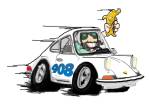
ttweed - Admin
- Posts: 1851
- Joined: Fri Jul 02, 2004 7:13 am
- Location: La Jolla, CA
Re: Noise Levels enforced at the next AX!!!???
But Tom...you sound like the perfect person. 
John
John
John Straub...56 year member...PCASDR
1965 911
1967 911
1970 914/6GT,(Sold)
Websitehttp://www.JohnStraubImageWorks.com
1965 911
1967 911
1970 914/6GT,(Sold)
Websitehttp://www.JohnStraubImageWorks.com
-
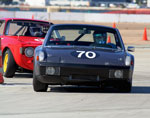
John Straub - Club Racer
- Posts: 991
- Joined: Wed Jun 30, 2004 3:13 pm
- Location: La Mesa
Re: Noise Levels enforced at the next AX!!!???
I suggest we send Bill B. to camp out at the nearest apartments/homes and report back when a car is exceptionally loud. Very relaxing job after AX chair!
- richard
- Time Trialer
- Posts: 212
- Joined: Wed Aug 18, 2004 6:06 pm
Re: Noise Levels enforced at the next AX!!!???
ttweed wrote:
Obviously, the stadium environment does NOT meet the basic requirement of "extensive open space" required for objective testing by this standard. Any readings we obtain with a sound meter are therefore tainted and unreliable. My concern is that these measurements will be used to disqualify marginally non-compliant cars as if they were objectively reliable. That is not to say that they shouldn't be taken into account, just that the "standard" of a 93db measurement at some "unspecified" distance (as contained in the stadium agreement) should not be used as the definitive method for a judgment on disqualification. What we are really dealing with is the "the subjective appraisal of the annoyance" of our vehicles to the surrounding neighborhood. IMHO, this should be done by a Sound Chairperson(s) whose sole job is to evaluate ALL the subjective and (nominally) objective data available on any given day to make the judgment call as to a vehicle's suitability to run at our events. We know what too loud is. Heck, I think our PA system is loud enough to be annoying to the neighbors at times! The event chairs have enough other things to worry about besides making these calls. If we are really concerned with compliance AND fairness to our participants, there should be a dedicated team to exercise this authority in a consistent and even-handed manner. People should be warned several times prior to any disqualification (except possibly in extreme and obvious cases), and be given a chance to comply before being ejected. Marginally non-compliant vehicles should be given the benefit of the doubt inherent in our measurement techniques, and not be sent home simply because they measured 93.5db on a single run using dubious measurement techniques. I would rather depend on the judgment of a dedicated individual (or team) taking all evidence into account and making a seasoned, consistent, subjective appraisal.
That's my $.02.
TT
Edit: To prove I know how things work in this club: NO, I AM NOT VOLUNTEERING TO BE THE SOUND CHAIR!
Tom, This post is why you are the wise 'ol elderly statesman of the club!!! (I threw in the extra 'ol for reaction purposes
I'll start by saying that the past and current AX chairs have a very difficult job.... a job I would not want, so kudos to them for doing it.
I personally know of 4 people who have stopped autocrossing since this whole debate started last fall, myself included and I'm sure there are many more. The fact that our average number of participants went from appx. 120-125 to 75-80 is no coincidence. The catch all phrase is, "It's because of the economy". Well if you believe that, then you're simply fooling yourself. Autocrossing is the cheapest, most convenient, driving event we do at a $45 and even $50 is a bargain. Are there people who have stopped because of the economy? Sure, but 50-60 people PER EVENT since this whole debate started? Absolute nonsense. Look at the timing of this topic discussion vs. the number of drop offs. The numbers don't lie.
Ask yourself, were there cars that were too loud? Yes, and everyone knew who they were, but they were just a handful-- pull them aside and ask them to fix it or not return the next time. Buying a $500 sound meter LAST YEAR and we STILL don't have a meaningful way of measurement and when the club is in financial difficulty is telling in and of itself.
My stock car measured 92.5 and 93 db at a PCASDR Qualcomm event last fall when this all started. I know for a fact, that is incorrect because I can pass at Laguna Seca, going up the hill toward the cork screw without lifting like others have to do to fall below the 92 db sound ceiling there -- And Laguna does not take going over it's sound levels lightly. I also have NEVER gone over the 92 db level at the SDBMWCCA events at Qualcomm in my GT3, so when I was told I went over at the stadium, I said to myself, "Do I have to defend myself each time I come down here and risk being thrown out knowing I have a stock car and am really below the 92 db, but because of arbitrary measuring techniques I don't have a leg to stand on?" I do this for fun. Having to worry about this is not fun and have chosen to not participate until there is a policy in place to clear this up.
Tom's solution takes into the account the margin of error in PCA measurement parameters and should be taken into consideration for future events.
PS: Hopefully a solution can be found before the anticipated DE school in July at Qualcomm. We have to measure sound for that and with any luck, Tom Tweed, Matt Kogan or someone else with broadbased knowledge spanning across multiple clubs that use Qualcomm for their events can guide us with sound measuring that is relatively accurate.
Peter Busalacchi
-

SDGT3 - Time Trialer
- Posts: 371
- Joined: Fri Feb 16, 2007 5:09 pm
Re: Noise Levels enforced at the next AX!!!???
Doesn't Peter sound like a perfect prospect for Sound Chair? Or should this fall under Tech Chair responsibilities?
Curt Yaws
2004 GT3
2004 GT3
-

Curt Yaws - Time Trialer
- Posts: 220
- Joined: Mon Mar 06, 2006 9:15 pm
- Location: Point Loma
Re: Noise Levels enforced at the next AX!!!???
Curt,
I defer to those smarter than me, that's why I've nominated Tom Tweed and not Matt Kogan.
I still love you Matt..
I defer to those smarter than me, that's why I've nominated Tom Tweed and not Matt Kogan.
I still love you Matt..

Peter Busalacchi
-

SDGT3 - Time Trialer
- Posts: 371
- Joined: Fri Feb 16, 2007 5:09 pm
Re: Noise Levels enforced at the next AX!!!???
Ouch, this sounds like a BMW problem. 
Curt Yaws
2004 GT3
2004 GT3
-

Curt Yaws - Time Trialer
- Posts: 220
- Joined: Mon Mar 06, 2006 9:15 pm
- Location: Point Loma
Re: Noise Levels enforced at the next AX!!!???
Curt Yaws wrote:Ouch, this sounds like a BMW problem.
Yea, Matt's dog almost attacked me in the paddock area last year. I haven't forgiven him since... but trust me, he's not that bright either...
Peter Busalacchi
-

SDGT3 - Time Trialer
- Posts: 371
- Joined: Fri Feb 16, 2007 5:09 pm
Re: Noise Levels enforced at the next AX!!!???
Tom is being pretty quiet. 
John
John
John Straub...56 year member...PCASDR
1965 911
1967 911
1970 914/6GT,(Sold)
Websitehttp://www.JohnStraubImageWorks.com
1965 911
1967 911
1970 914/6GT,(Sold)
Websitehttp://www.JohnStraubImageWorks.com
-

John Straub - Club Racer
- Posts: 991
- Joined: Wed Jun 30, 2004 3:13 pm
- Location: La Mesa
Re: Noise Levels enforced at the next AX!!!???
I just found this on the internet. Who would have thought that somebody researched this. 

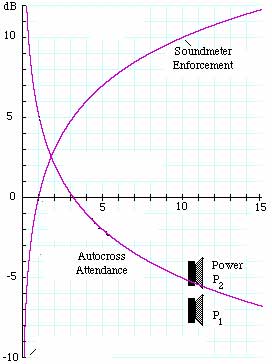




"Illegitimi caudex non carborundum"
-

MR LIPP - Club Racer
- Posts: 806
- Joined: Mon Mar 03, 2008 12:55 pm
- Location: Lost in Cyberspace
Re: Noise Levels enforced at the next AX!!!???
John Straub wrote:Tom is being pretty quiet.
John
No pun intended, right?

I will not nominate Martin Lipp for Sound Meter Chair either. If we did, the meter might end up in the San Diego River on the other side of the trolley bridge...

Peter Busalacchi
-

SDGT3 - Time Trialer
- Posts: 371
- Joined: Fri Feb 16, 2007 5:09 pm
Re: Noise Levels enforced at the next AX!!!???
Hi all,
Reading Tom and Peter’s posts gave me an idea. In order to attempt to make this as equitable as possible, perhaps we can have a sound tech area at events, or even a separate day to have our cars qualified. Then once they are we would have that noted by a card or whatever which is presented at Tech inspection. The card would have to be an honor system from that point forward and would be good for a given time (a year?) until exhaust/intake major HP changes were made at which point they would ask to be re-certified. As to the arbitrariness and variability of readings that is also something which can be accounted for somewhat when setting up the test area.
I took a bit of time and contacted several Sound Reinforcement companies, Carvin here in San Diego was one of them. The problem we are facing in getting accurate readings has been stated, but I will just try clarifying it a bit. Getting a reading of 93db is fairly easy, in fact at the right distance and angle a bird chirp can achieve it, literally. The tough thing is getting something to generate a consistent 93db sound so that you can place the db meter correctly. After talking with the sound tech at Carvin for a while, the best workable idea we came up with was this.
On several different days set up the sound system in an open outside area then ideally doing it at the stadium, place the db meter at 100 feet and using a white noise generator (which produced consistent noise over a wide spectrum of frequencies), increase the system volume until 93db is achieved. Take note of where the volume setting lands to do this. By testing it on different days you should be able to get a reasonable base line volume setting. Then when you set up the test area at an event you would set the meter at 100 ft, and run the white noise through the sound system at the base line volume. Then take a reading on the db meter, which will show the variable for that specific day. For instance where the base line should have been 93db on that day its 97db, that means cars tested and certified that day would have a -4db adjustment when determining if they pass or not.
A method of how the car is run would need to be set, maybe full throttle through 1st and 2nd gear in a straight line 100ft from the meter or whatever is decided as having the possibly of producing the most exhaust volume.
Mark
Reading Tom and Peter’s posts gave me an idea. In order to attempt to make this as equitable as possible, perhaps we can have a sound tech area at events, or even a separate day to have our cars qualified. Then once they are we would have that noted by a card or whatever which is presented at Tech inspection. The card would have to be an honor system from that point forward and would be good for a given time (a year?) until exhaust/intake major HP changes were made at which point they would ask to be re-certified. As to the arbitrariness and variability of readings that is also something which can be accounted for somewhat when setting up the test area.
I took a bit of time and contacted several Sound Reinforcement companies, Carvin here in San Diego was one of them. The problem we are facing in getting accurate readings has been stated, but I will just try clarifying it a bit. Getting a reading of 93db is fairly easy, in fact at the right distance and angle a bird chirp can achieve it, literally. The tough thing is getting something to generate a consistent 93db sound so that you can place the db meter correctly. After talking with the sound tech at Carvin for a while, the best workable idea we came up with was this.
On several different days set up the sound system in an open outside area then ideally doing it at the stadium, place the db meter at 100 feet and using a white noise generator (which produced consistent noise over a wide spectrum of frequencies), increase the system volume until 93db is achieved. Take note of where the volume setting lands to do this. By testing it on different days you should be able to get a reasonable base line volume setting. Then when you set up the test area at an event you would set the meter at 100 ft, and run the white noise through the sound system at the base line volume. Then take a reading on the db meter, which will show the variable for that specific day. For instance where the base line should have been 93db on that day its 97db, that means cars tested and certified that day would have a -4db adjustment when determining if they pass or not.
A method of how the car is run would need to be set, maybe full throttle through 1st and 2nd gear in a straight line 100ft from the meter or whatever is decided as having the possibly of producing the most exhaust volume.
Mark
85.1 944 Sparky
'87 924S "Tuffy" #123, CC03
'81 928 "Leviathan" Gone to the great beyond.
'87 924S "Tuffy" #123, CC03
'81 928 "Leviathan" Gone to the great beyond.
-
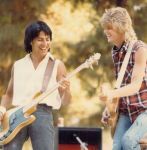
Mmagus - Club Racer
- Posts: 875
- Joined: Mon Oct 19, 2009 9:43 pm
Re: Noise Levels enforced at the next AX!!!???
Mmagus wrote:Hi all,
Reading Tom and Peter’s posts gave me an idea. In order to attempt to make this as equitable as possible, perhaps we can have a sound tech area at events, or even a separate day to have our cars qualified. Then once they are we would have that noted by a card or whatever which is presented at Tech inspection. The card would have to be an honor system from that point forward and would be good for a given time (a year?) until exhaust/intake major HP changes were made at which point they would ask to be re-certified. As to the arbitrariness and variability of readings that is also something which can be accounted for somewhat when setting up the test area.
I took a bit of time and contacted several Sound Reinforcement companies, Carvin here in San Diego was one of them. The problem we are facing in getting accurate readings has been stated, but I will just try clarifying it a bit. Getting a reading of 93db is fairly easy, in fact at the right distance and angle a bird chirp can achieve it, literally. The tough thing is getting something to generate a consistent 93db sound so that you can place the db meter correctly. After talking with the sound tech at Carvin for a while, the best workable idea we came up with was this.
On several different days set up the sound system in an open outside area then ideally doing it at the stadium, place the db meter at 100 feet and using a white noise generator (which produced consistent noise over a wide spectrum of frequencies), increase the system volume until 93db is achieved. Take note of where the volume setting lands to do this. By testing it on different days you should be able to get a reasonable base line volume setting. Then when you set up the test area at an event you would set the meter at 100 ft, and run the white noise through the sound system at the base line volume. Then take a reading on the db meter, which will show the variable for that specific day. For instance where the base line should have been 93db on that day its 97db, that means cars tested and certified that day would have a -4db adjustment when determining if they pass or not.
A method of how the car is run would need to be set, maybe full throttle through 1st and 2nd gear in a straight line 100ft from the meter or whatever is decided as having the possibly of producing the most exhaust volume.
Mark
All that just to autocross? No wonder attendance is down......
David Malmberg
2015-2016 AX CDI team
PCA National DE Instructor
member, Texas Mile 200 MPH club
"A finish is a win! Moderation is the key! More whine!"
2015-2016 AX CDI team
PCA National DE Instructor
member, Texas Mile 200 MPH club
"A finish is a win! Moderation is the key! More whine!"
-
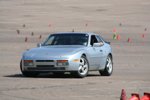
LUCKY DAVE - Club Racer
- Posts: 582
- Joined: Mon Apr 30, 2007 7:49 pm
- Location: Leucadia ca
Re: Noise Levels enforced at the next AX!!!???
[/quote]
All that just to autocross? No wonder attendance is down......[/quote]
No...Not at all. That was a just a possible idea to bring equity to the sound issue, All the autocross competetor would do is drive their car down a straight line and back if they pass they get a card and are good for a year. Simple. I guess another way would be to set the meter out somewhere on the course and hope for the best...at least that would be consistant...in its inconsistancy.
I guess another way would be to set the meter out somewhere on the course and hope for the best...at least that would be consistant...in its inconsistancy. 
All that just to autocross? No wonder attendance is down......[/quote]
No...Not at all. That was a just a possible idea to bring equity to the sound issue, All the autocross competetor would do is drive their car down a straight line and back if they pass they get a card and are good for a year. Simple.
85.1 944 Sparky
'87 924S "Tuffy" #123, CC03
'81 928 "Leviathan" Gone to the great beyond.
'87 924S "Tuffy" #123, CC03
'81 928 "Leviathan" Gone to the great beyond.
-

Mmagus - Club Racer
- Posts: 875
- Joined: Mon Oct 19, 2009 9:43 pm
50 posts
• Page 2 of 4 • 1, 2, 3, 4
Who is online
Users browsing this forum: No registered users and 25 guests
